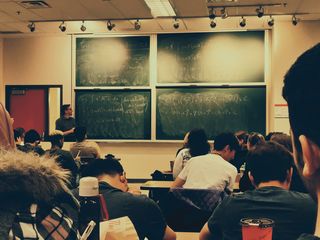
Sleep
School Start Times and Teens' Sleep Needs
California is the first state to pass law delaying school start times.
Posted October 18, 2019 Reviewed by Kaja Perina

In 2014, the American Academy of Pediatrics recommended that middle and high school start no earlier than 8:30 a.m. And just this week, California was the first state to pass into law school start times of no earlier than 8 a.m. for middle schools and 8:30 a.m. for high schools. Communities all over the nation are having heated discussions about whether to delay school start times for middle and high school students, and some have adopted changes at the local level. California’s decision, though, is the largest-scale policy change to date and many parents, educators, students, scientists and policymakers are paying attention.
With the heightened discourse around school start times, what do we know? We know that adolescents undergo significant biological changes that impact their circadian rhythm—as a result, their biological clocks shift so that their bodies naturally want to go to sleep later. However, in many communities, these biological shifts are at odds with school schedules which often have younger, elementary school age youth beginning school later, and older, high-school teens beginning school earlier.
As a result of the mismatch between biological changes and earlier school start times, teenagers are often unable to sleep the recommended 8-10 hours per night that is recommended for this age. In fact, national studies show that teenagers are one of the most sleep-deprived groups in the country with only 15 percent getting the recommended hours of sleep. As a result, communities have begun to consider how moving high school start times later in the morning might assist teenagers in getting more sleep.
Why does this matter? The research is clear that sleep is critical for healthy functioning and development at all points across the lifespan. Sleep disturbances have been linked to a host of outcomes including more difficulty concentrating and learning new material, lower academic performance, higher rates of obesity, increased inflammation, higher mortality, and compromised psychological health. In short, the science is clear—sleep matters and teenagers are not getting enough.
If sleep is so important, teenagers are not getting enough, and early school start times are part of the problem—why the resistance to delaying school start times? One reason is that since communities are just beginning to consider moving school start times, there is limited data tracking changes in sleep as a result of delaying school start times.
For example, in the Seattle School District, high school start times were delayed to 8:45 a.m. (from 7:50 a.m.). Researchers took this opportunity to measure adolescent sleep before and after the school delay was implemented and asked students to wear a wrist actigraph to measure sleep for 2 weeks. Comparing the sleep and academics from 2016 to one year after the district implemented the later start time, researchers found that students slept an average of 34 minutes more after the start time delay. Moreover, the increase in sleep duration was explained by students waking up later (that is, students were still going to bed around the same time). In addition, delaying school start times was also associated with higher grades, lower levels of daytime sleepiness, and fewer first-period tardies and absences. Sounds great—so why the resistance?
While the data from the Seattle school system is exciting and certainly what school start time advocates would hope for, the study included only two high schools with notably different demographics. It was only in the school with more socioeconomically disadvantaged youth and more ethnic/racial minority students were that delaying the school start time was related to improved punctuality and fewer absences.
So where does this leave the many stakeholders that have a vested interest in where communities fall on the side of delaying versus maintaining current school start times? As a parent, I would love to see my children wake up a little later on school mornings. As a scientist, I would love to see more data like those from the Seattle public schools where we can investigate the short and long-term impact of delaying school start times for teenagers from a diversity of backgrounds, across various communities. With California schools leading the way in implementing a delay at the state level, in the next three years, it is my hope that we will have more information and data about all the ways in which school start times impact all levels of a school system (e.g., bus drivers, teachers, students, parents, families, administrators) and for all students.
References
Dewald, J. F., Meijer, A. M., Oort, F. J., Kerkhof, G. A., & Bögels, S. M. (2010). The influence of sleep quality, sleep duration and sleepiness on school performance in children and adolescents: A meta-analytic review. Sleep medicine reviews, 14(3), 179-189.
Dunster, G. P., de la Iglesia, L., Ben-Hamo, M., Nave, C., Fleischer, J. G., Panda, S., & Horacio, O. (2018). Sleepmore in Seattle: Later school start times are associated with more sleep and better performance in high school students. Science advances, 4(12), eaau6200.

